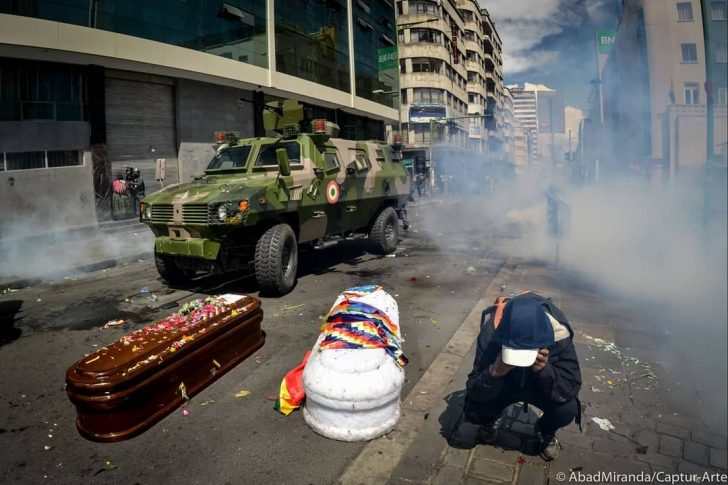CELS, the Andean Information Network, the Pro Human Rights Bolivia Association, the University Network for Human Rights and the Europe – Third World Center (CETIM) submitted two complaints to the United Nations denouncing the massacres at Sacaba (Cochabamba, November 15, 2019) and Senkata (El Alto, La Paz, November 19, 2019). Both occurred after the forced resignation of Evo Morales, followed by the illegal accession of Jeanine Áñez with support from the Armed Forces.
The abundant evidence submitted shows that the Armed Forces and police used lethal weapons to suppress protests opposing the Áñez government and in defense of the Wiphala flag, leaving 21 people dead and over 70 wounded. On November 14, one day before the massacre at Sacaba, Áñez signed a decree guaranteeing impunity for the Armed Forces. No medical care was provided to the victims of the repression. On the contrary, in both events witness accounts say that people who tried to provide help were also fired at. The violence continued in hospitals: victims were harassed by police and hospital staff with racial insults and humiliation for alleged association with the MAS party. The complaints submitted to the Special Rapporteur on Extrajudicial, Summary or Arbitrary Executions and the UN Working Group on Arbitrary Detentions are based on abundant evidence, including dozens of audio recordings, images, videos and interviews obtained by Bolivian and international organizations and systematically organized jointly. Testimonies gathered by the Argentine Delegation in Solidarity with the Bolivian People in a mission carried out ten days after the massacres also provided evidence.
Nine months later
Jeanine Áñez has since repealed the impunity decree but no subsequent investigation has determined responsibility for the killings and serious injuries to people exercising their right to protest. On the contrary, in the weeks following the events, evidence was destroyed, many witnesses were victims of threats and torture, the armed and security forces refused to give the prosecutor information on who was in command of the operations, what units were mobilized or the weapons they were carrying. Even more concerning is the fact that there are still people being held in arbitrary detention for participating in the November protests. The victims have not received any type of assistance. Many people went into debt to cover the costs of medical care and had injuries that kept them out of work.
The political persecution, restriction, repression and criminalization of protests have not stopped but have grown worse in Bolivia. In the past weeks, union and peasant movements have mobilized throughout the country over another change of date for the elections to October 18. The de facto government attributes the lack of hospital supplies for combatting Covid-19 to the road blocks – despite the fact that medical aid and ambulances have not been blocked – and is gearing up to respond to protests with repressive measures. There are also armed civilian groups mobilizing against protesters.
The international community must continue to demand truth and justice for the victims of Sacaba and Senkata, the immediate release of persons being held in arbitrary detention and continue to monitor the human rights situation in Bolivia until democracy is reestablished in the country.
Photo: Abad Miranda

